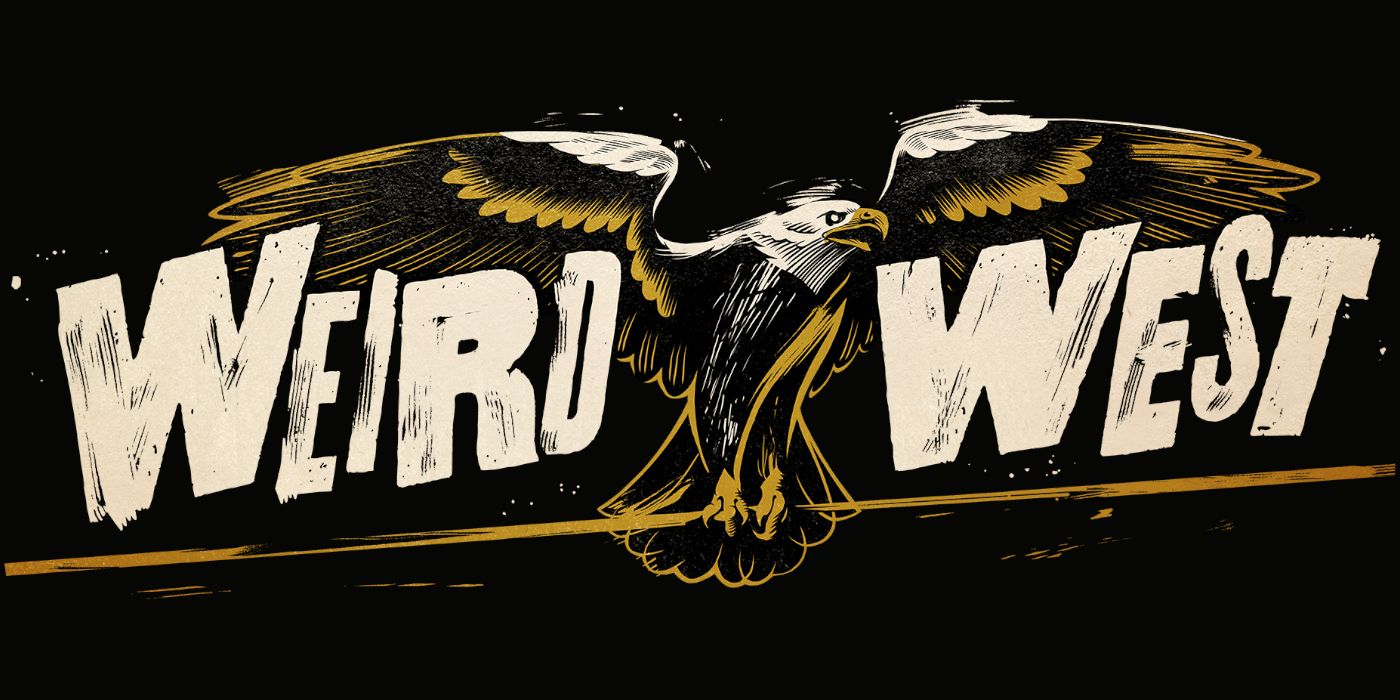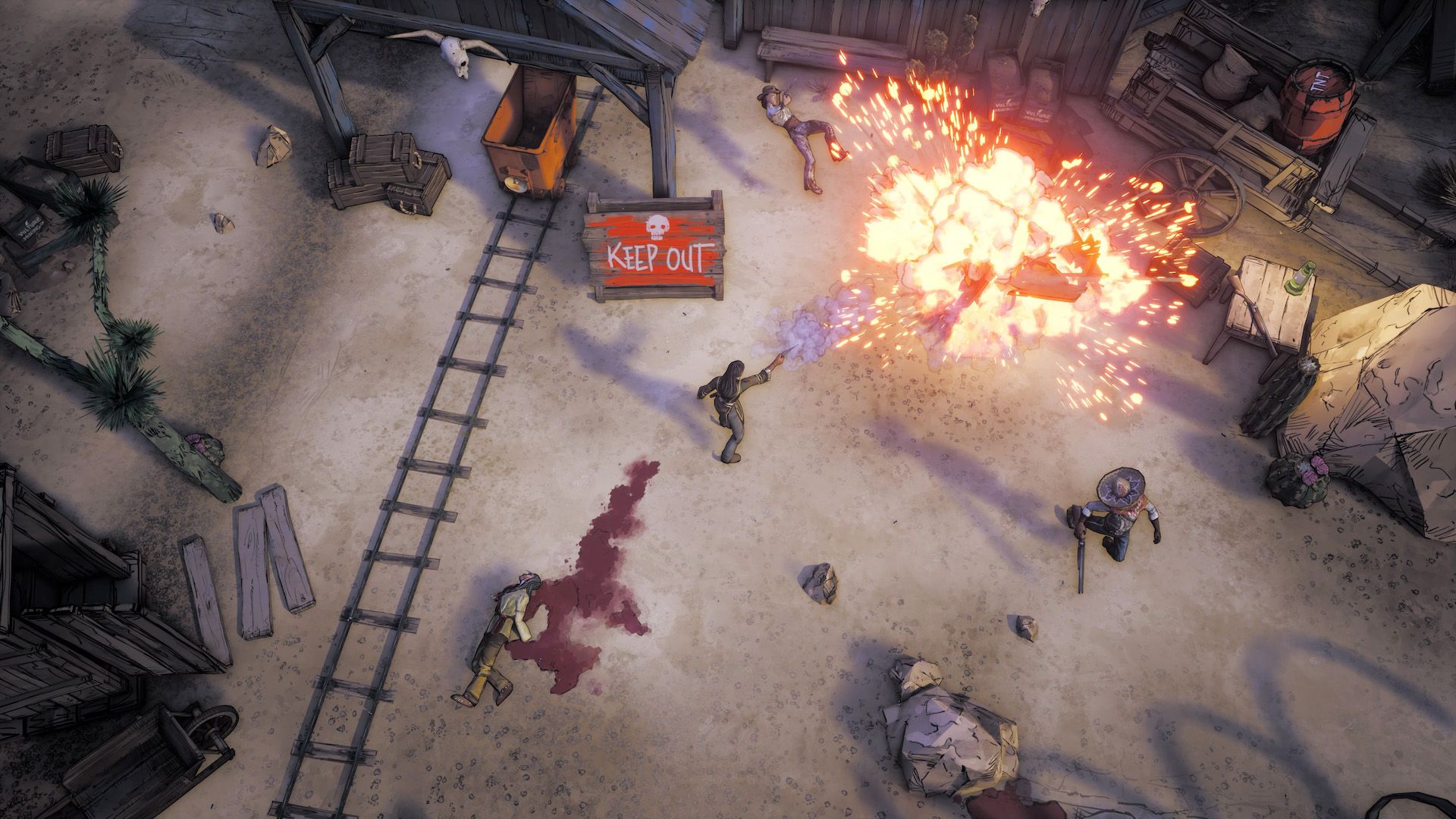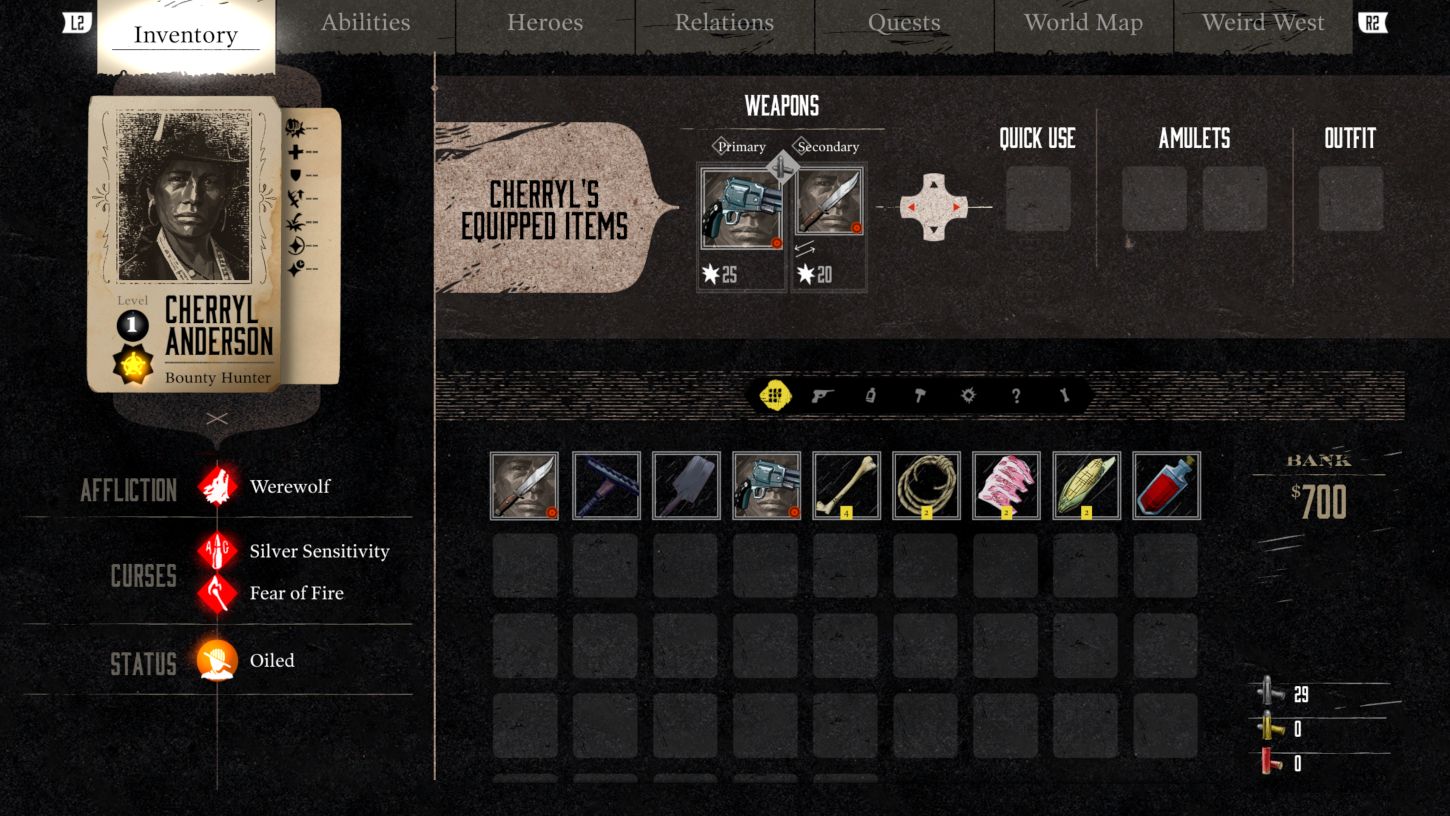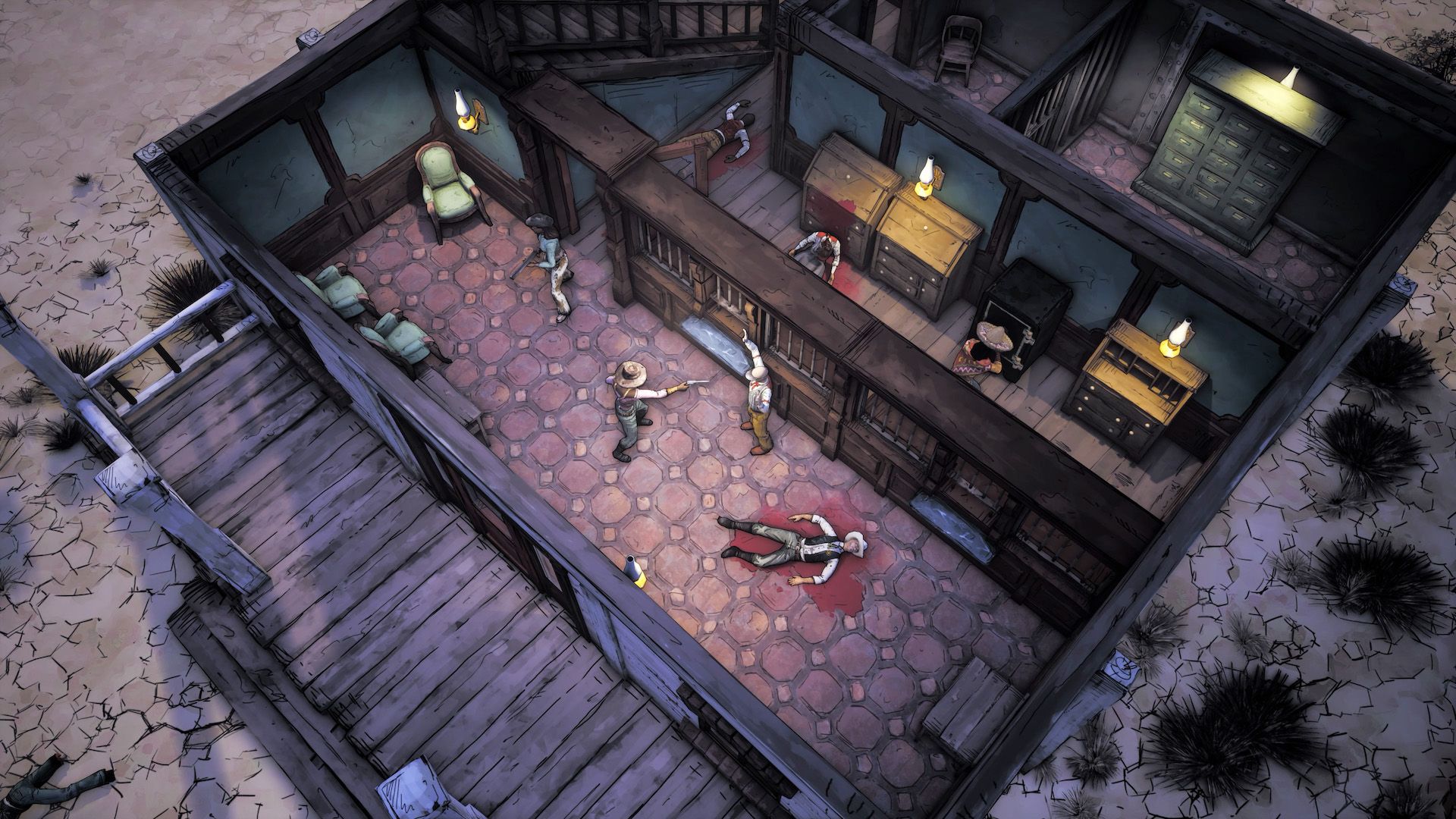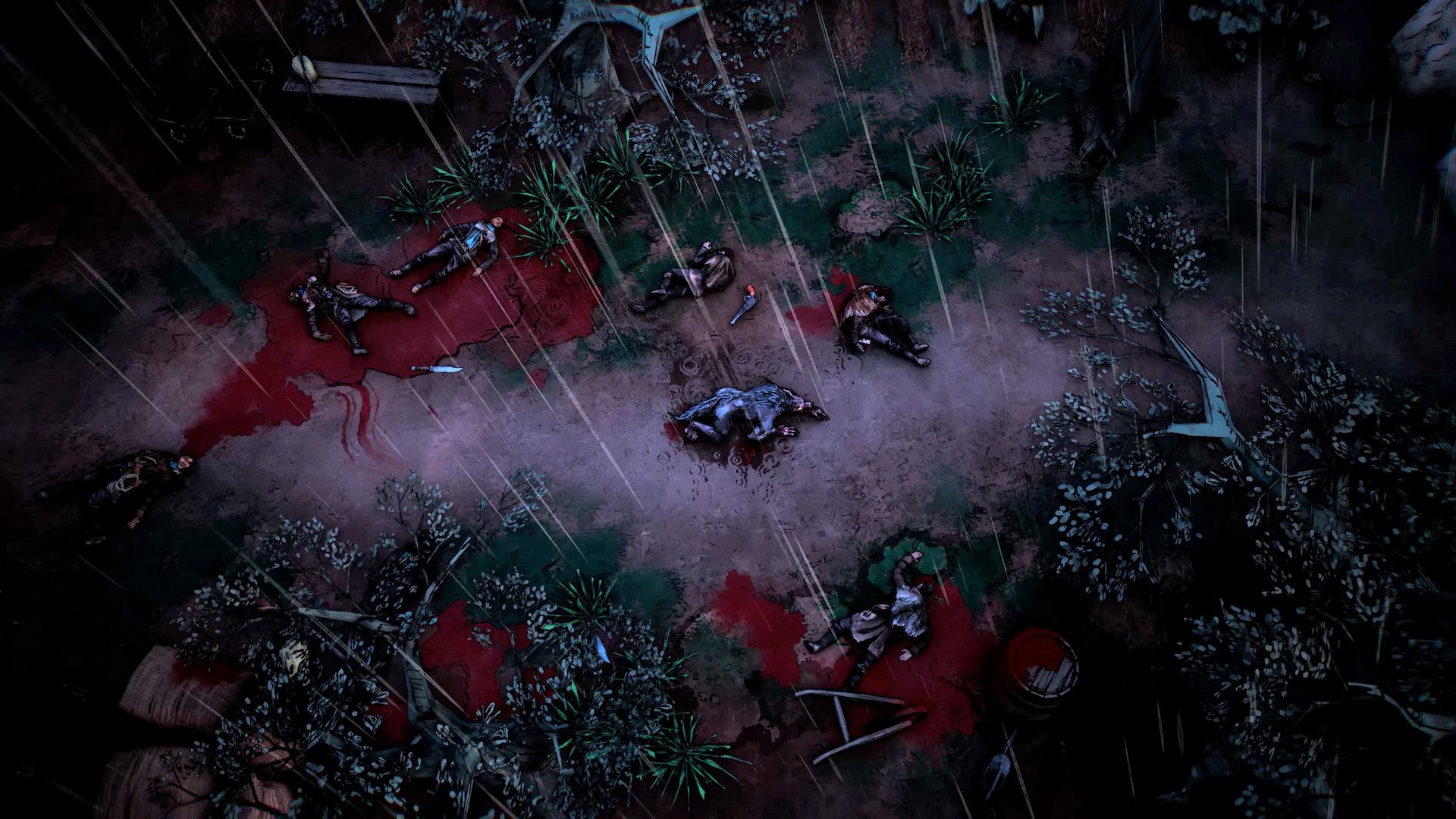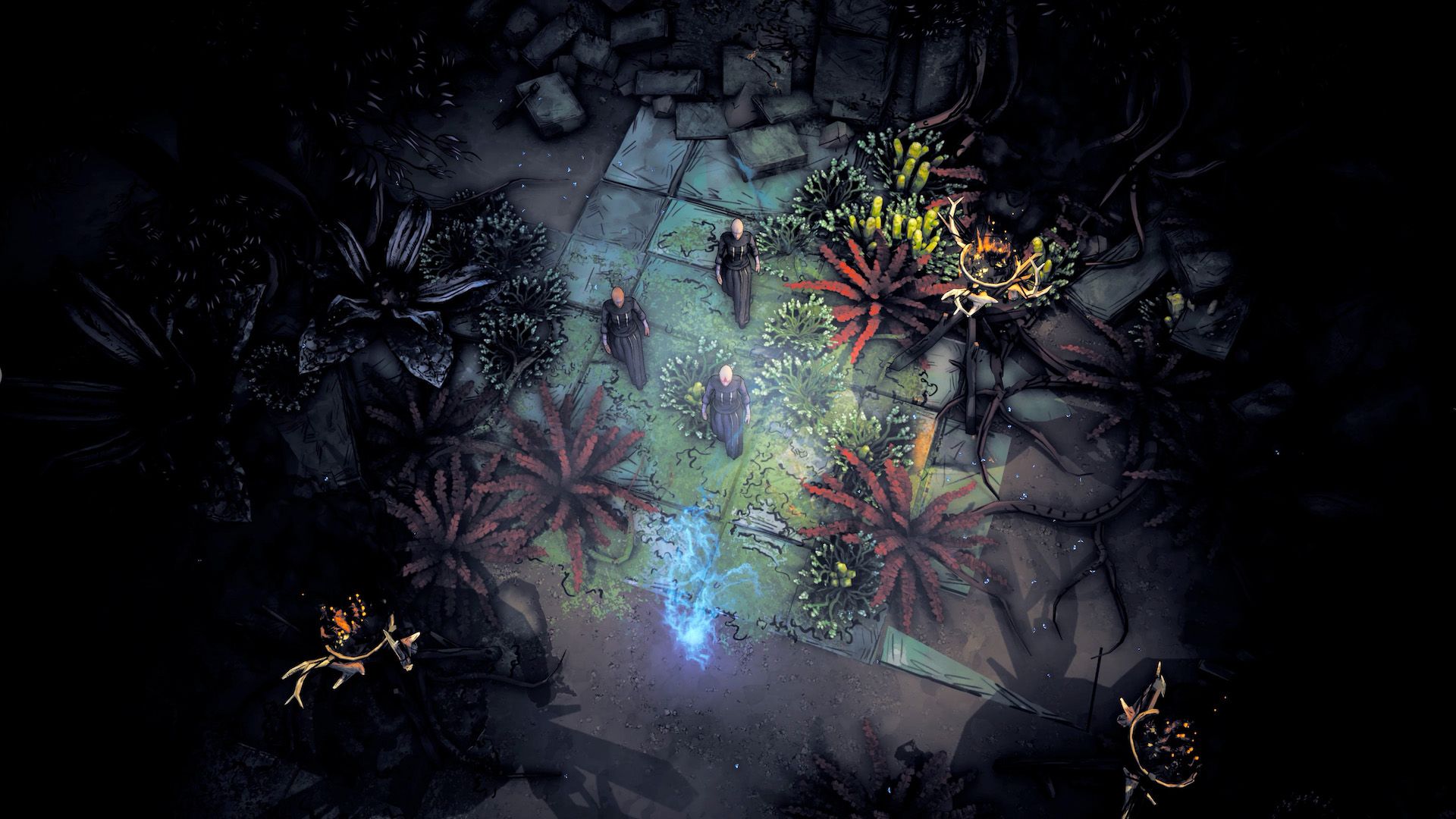Westerns are something of a rare genre these days, and those in the “weird west” subgenre are yet rarer. Taking the setting, stresses, baggage, and iconography of the American old west and blending it with other genres and themes — frequently sci-fi and supernatural horror — the weird western has always been at the hinterlands of various mediums, including gaming, but Devolver Digital’s newest upcoming Weird West looks to be one of the most ambitious examples.
The recently minted Wolfeye Studios is taking a stab at this niche, boasting a staff featuring some of the luminaries behind beloved gaming properties like Dishonored and 2017’s Prey, prime examples of contemporary immersive sims. Like those titles, Weird West intends to give players utmost control over the story and environment, mixing reflex-based gameplay with traps, spells, and werewolves, all along a branching consequential narrative.
All players have had are veritable teasers to work from so far, but Wolfeye president and creative director Raphael Colantonio graciously took some time to chat with Screen Rant and delve a little deeper into the elaborate inner workings of Weird West.
Weird West has no announced release date yet, but is expected to come out in 2021.
What can you tell us about the overarching story, generally speaking?
Raphael Colantonio: Okay, [so] this is a cop out: it starts as something that feels pretty classic. Like, you know, “my spouse was abducted by this gang.” But then, little by little, you find out that you are in a much deeper mystery. These five heroes, for reasons that they don’t even know at first, are all linked to the same thing. There’s a brand on [the character’s neck] where, every time you start a quest – we call them “journeys” – there’s a mystery about that brand and why you have it.
So that’s what the game is about. You’re going to eventually realize what’s behind all that.
This is a very specific genre that is kind of rare overall. Where did you guys come up with the idea of applying “weird west” to an immersive sim?
Raphael Colantonio: It’s not like we saw The Dark Tower or played the Deadlands RPG and then we thought, “Ah, we need to make a game based on that world.” It’s definitely not that. It’s more like…the weird west is a very, very niche genre. It’s not like a specific product, [where] I look at it like, what is "medieval fantasy" to "medieval?" If you look at those worlds – whether it’s the medieval worlds or the wild west – they both have something in common, in that it’s a one-to-one kind of world. If you think “medieval,” everybody imagines the same thing, like a knight coming on a horse is going to save this princess or whatever it is that would make this world, and there’s a troll on the way.
Of course, it’s inspired by old legends, but there’s something else. They all have these clichés, and those simple worlds allow for actually very accessible stories, that can [yet] be extremely deep and interesting and relatable, as opposed to some more modern politics or complicated conflicts with conspiracies. So I think that’s why these worlds are so easy to be drawn into. They usually go with simple stories of revenge or control of land, things that many people can grasp.
Now, if you add the mystery layer to that, you know, sorcery, magic, occult, weird horror, whatever it is, and get inspired by things like Lovecraft or Edgar Allan Poe, then you have, I think, a very interesting world. And some of us were …So it just felt…We did not look at it like a marketing opportunity. It’s interesting because it is, I think, a market opportunity. Because there aren’t that many, it’s a weird like, small niche that hasn’t been exploited at all. But that’s not how we looked at it, we just looked at it like, what is that we want to do? And it felt compelling to all of us.
When we did Dishonored, we were not thinking steampunk, specifically. We were thinking: England, weird technology, some magic. And then people said, “Oh, steampunk!” But we made our own version of it. And I think, for the Weird West, it’s a little bit of the same. We’re taking the wild west, we’re adding some stuff, etc. We’re not like, taking other people’s references, we’re more into doing our own thing, so I think it will have its own vibe. Yes, it has to fall into the weird west category, but it’s a subtle difference, though. As opposed to like, taking a genre and doing the canon version of that; it’s more like, our own path to weird west.
All of our games, I can tell you, we start thinking very, very much RPG. We start thinking stats and skills, this and that, millions of weapons, and all the things that RPGs do. And, for some reason, invariably, we go back to like, “You know what? It’s more fun to just be accessible, walk around, jump, shoot, do things.” So what we like is somewhere in between. We like the depth of RPGs, all the possibilities, all the things that they allow you to do, but we don’t like the turn-based [part]. At at the end of the day, our games are at the intersection between the depth of RPGs and the immediacy of action, but all [while] still hoping that players feel a big level of authoring of their own experience, and that they feel like they are playing the way they want, as opposed to a prescribed way.
But, if I’m not mistaken, you’re making a game that prohibits save-scumming? Did I understand that correctly?
Raphael Colantonio: Yeah. We’re doing something…but it’s not never [been] seen before. I mean, frankly, Bioshock does that. You play and you resurrect in vita chambers, right?
Right. But it still happened, whatever you did happened.
Raphael Colantonio: But what you did happened. That’s the nuance compared to a save game system where you just go like, “You know what? I’m gonna try this crazy thing, and if it’s a mistake then I go back in time.” You can’t do that in this game.
That’s basically how I play Dishonored. I want every interaction to be absolutely flawless, and it’s like, go back, go back, I’m gonna get this right. But this game isn’t designed with that in mind, which I feel like, immediately, that’s gonna have its critics. Because there are people who insist that they want, like you describe, the authored experience. In their canonical playthrough of a given game, they are perfect, that is their canon. You know, they never messed up, they never missed a shot. But this is not going to incorporate that.
Raphael Colantonio: That’s right. In our current incarnation…[but] you never know. As the game shifts, and everybody screams, we might do a version [with save states]. Because, at the end of the day, we do want people to enjoy themselves in the game. But we think it’s also an interesting thing.
I mean, look at – I think a game that really uses that well was Shadow of Mordor. Because it would be based on opportunities. You knew that you had this villain that you had to take down, but you had these moments. And you go there, and shit, you missed it. Or it killed you, bummer. Or he escaped as you were chasing it. In a game where you can save, this kind of tension doesn’t exist. It would be a different game. And then, that gives them opportunity to keep going, and send them this nemesis back at you, bigger.
My point is, I guess, depending on the games, different things work. And I think I, frankly, you know, I’m a designer full of doubts. Of course we worry, we’re not perfect. We try things. And that’s also how games evolve, and the game industry finds new opportunities. So we’re trying that, hopefully it works.
I’m personally a semi-fan of westerns, but I definitely like some of them a lot. I have a pretty good knowledge of the genre, and I also have a specific awareness of the present political reality. And I do think that westerns are a genre that are, if not suffused or concerned with racism, certainly interact with it. And, in a certain way, I feel like they responsibly should. Are those going to be topics that are explored and dealt with in Weird West?
Raphael Colantonio: Yeah, of course, of course. The question, really, is, where do you draw the line between avoiding those topics and rewriting history, versus treating the topics right? And there’s more. It’s not just the wild west, it’s also the world right now being different and evolving. And this is an opportunity because it’s a different world, at the same time — it’s not based on the real wild west. But you still have to represent some of the canon of the wild west. So it’s a very, very delicate topic. And we’ve consulted with a variety of groups. But yeah, it’s in there. It’s definitely something we think about all the time. Also: one of our writers is Native-descended.
Could you describe a little bit about the expected flow of the game? Because I thought at first like, I'd pick my character and I go through the game, but it sounds like it’s actually a group narrative. Can you say something about how that’s structured right now? Is the point that you’ll be playing everybody in this group, or will you choose your favorite and that’s your go-to character? How does that all click together?
Raphael Colantonio: The structure is a little different than most action RPGs, in the sense that, instead of one big arch of a main quest, we have five smaller main quests, and each of them starts with a hero. So it’s a relay of main quests, basically. At the beginning of this game you have this hero, and the end of this main quest, you leave that hero in the world and you start with another one. Now, that hero is still in the world so, with your new hero, you can still go and find where that former hero was and recruit them so that they are now added to your team.
Now, whether it’s a former hero or whether it’s a random NPC in the game that you recruited because you saved him or her – they were in a cage, and you opened the cage – with the right conditions they ask you if they could join. So whether it’s a former hero or whether it’s a random NPC, they follow you in the party, but you never switch the controls. It’s always the hero that started the quest that is going to be under your control. The other ones are more like followers, extra NPCs around you with AI that make their own decisions. You can still change what they’re wearing, or if you’re trying to unlock a door that’s too high for you, if one of your companions or followers has a higher level of lockpicking, they can offer to do it. But that’s about it.
Because of the structure where you cannot reload, you cannot go back in time…so if one of the followers die, that’s it.
Is there another interesting mechanic in this game that you feel I’m not asking you about? Picking locks is cool, but we’ve picked a lot of locks in games. Is there something in here that’s more of a wildcard?
Raphael Colantonio: I mean, of course, there are still some mechanics that try to fit the overall experience. You know, tons of things that are very action-y and canonical to western movies. Personally, though, I’m more interested in some of the elements that really impact the experience, almost at a structural level.
There’s always a controversy about procedural generation, right? Procedural options feel random and kinda works in a roguelike, but not always in a solid authored experience. Yet, it can be very fascinating, and I think, in many ways, it’s the future. So we pushed it – to how far we wanted it anyway – to have you as the player playing in an experience that is mostly controlled by script and storytelling. Even though that storytelling has multiple branches that have been authored, and multiple ways to do things, that’s still a human [who crafted] that.
But then, on top of that, there are also elements that are procedural. There’s an AI that we call The Conductor that actually listens for events, things that the player has done. It could be good things, it could be bad things, and then those things are served back to the player at inopportune moments. So that’s kind of cool, because it adds an element of chaos to a somewhat controlled experience, and it also feels more tailored and special for the player. Because, if you do that thing, there’s a logical consequence that’s not because of a branching point of the story [where] you said “yes” or “no” to someone. It’s more like because you attacked the wrong person somewhere, then you forgot about it, and then, you know…
I think that’s super-interesting because, in an ideal world, that’s where games would go at some point. Where you just imagine where the storyline is, some unlikely events happen, but then anything could happen in the middle. It’s almost like, if Westworld was a game, that would be the perfect game, where everyone has their own intentions and their own things that they’re doing, but then it can all be entirely deconstructed, but still fall back on its feet like a cat. So, that’s a fascinating area, for us as developers, like, how do we go there? I’m not saying we’re there, but as part of developing a new game, part of my passion and the passion of my team is to explore some of these things.
What are some of the current activities in Weird West that players can explore? Whether they’re diversional or directly related to getting through the game?
Raphael Colantonio: Some of them are very explicit like that, like an ability where you lockpick some thing or you steal some thing or you move a heavy object. And some of them are more systemic. Like, every character makes noise, and then you have perks to modify that. If you are highly stealthy than you don’t make as much noise, you’d need to be at a closer distance to be visible. If you crouch you’ll see view cones. So, this kind of gameplay and variability. And, based on the class that you play, you can specialize in different types of weapons. So there’s a good variability of paths that your character development can take, in addition to how you, independently, how your character is shaped, you can still do different things that have nothing to do with your skills.
So you can go practice stealth badly, even if you’re not a stealth character.
Raphael Colantonio: Yeah, yeah. Well, there’s that, but you can also like, play the back door/front door [approach]. Choices that are, in this case, more in the geometry [of an area] than a character path.
Can you say anything about the different classes?
Raphael Colantonio: You start with the bounty hunter, actually. And so, very much of a gunslinger-type character, so all the skills are around that. And there are some that I want to keep a little more secret. But, I think, from what the video shows, you can tell at one point you can also play a werewolf, for example. So that’s another type, with very different type of gameplay, because it’s all close combat instead.
And these are all tied to the five main characters. They’re all bespoke classes, but then you actually do shape those classes with experience point assignment and all that stuff.
Raphael Colantonio: That’s right.
Okay. So you can make your bounty hunter stealthier or more of a brute or something like that.
Raphael Colantonio: Yeah. But, the way I look at this game – all of the games I’ve worked on as a director – they all have this thing in common, is that it’s rare that those things – like, what skills we have, they do matter to some degree, they’re part of the ingredients that form the stew. But, really, what matters in the end, it’s when all of the layers combine together to create more unique play moments, game moments. And I think that’s what people, the people that respond well to our games, that’s what they respond well to, is how much they’ve felt like they’ve been part of something. As opposed to, oh, do you have bullet time, do you have this, do you have that. We never really had one feature that people could point to and say, “that thing is what makes the game.” What makes our games usually is the sum of all of it, if that makes sense.
As a player of your games, I would vote that one of the things that “makes” them and one of my favorite aspects of these types of games are just the storytelling opportunities. When you call your friend and you’re like, “Dude, check this out. I was in this, and I used this power, and it suddenly electrified the swimming pool.” The emergence of those like, emergent events and moments, that’s the magic.
Raphael Colantonio: I agree.
Where, I’m certain that some developer somewhere predicted that I could do that…but I still think to myself, “I did that.”
Raphael Colantonio: And sometimes the developers haven’t really predicted it! You know, we can never have all the context. And I agree, you’re very right. It’s always one of the hardest things for me to express. Believe me, it was even harder before my games were kinda famous, it was hell to explain to a publisher!
So then, there’s one thing I saw recently, and I don’t know if it serves any purpose, but it probably will, eventually. We have tornadoes in the world sometimes. It’s not something [that happens] often, but if you stand in a place for [a long time], it might eventually have a tornado that comes in, this twirly thing. And it pushes the physics around, makes a mess, etc. And if you’re caught in it, you ragdoll and all that. You now, it’s just to create an elemental hazard.
The thing that I didn’t even know myself is that… So, I was testing it in this little map, and we have a variety of different barrels and traps and stuff. So I shot at a barrel of poison, so there was now this poison gas. And then the tornado came in, and the tornado became poisonous. And now there was this poisonous tornado.
So, to your point of calling your friend, and saying like, “Dude, look at what happened! The tornado got poisoned!” Which would be cool.
Are there destructible buildings? You mentioned physics, so I’m wondering if any part of the world is actually breakable. Can I throw TNT at a building?
Raphael Colantonio: To some degree, yeah. We don’t make it a major feature, because most games which try it, it can be very hard for them, because it [becomes], you know, all about that, a destroyable environment game. But we do that, let’s say, in a way that matches expectations. You know, if you see a wooden door, it can be destroyed. A wooden reinforced door can also be destroyed, but it has a lot of armor.
We have an armor system. You know, if you shoot at it, you need to do a minimum threshold, otherwise the armor absorbs everything, and then only the damage that is above the armor actually gets into the HP of the object. So, if you try this with a knife, you will never break an armored door, because every hit is not strong enough to even do one single point of damage. I’m telling you that to give you a sense of the mechanics and thoughts that we have behind the simulation of the world.
Absolutely zero chance of multiplayer, right? Do I have that correct?
[At this question, Raphael reacts silently with what appears to be mock confusion].
Maybe not? Maybe multiplayer, then? This looks like such a great multiplayer experience. And when you just spoke about finding your old NPC, that to me sounds like a perfect opportunity for co-op or couch co-op.
Raphael Colantonio: That would be very nice.

